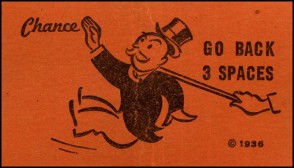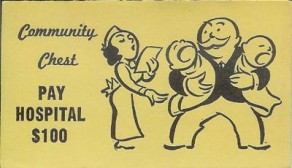Business Basics Learned at 11
Just one more time, I thought to myself, releasing the paper for the hundredth time. Inside the house my mom must have been going crazy listening to the newspapers thudding on the front porch.
Over and over I threw the newspapers. Sometimes standing on the sidewalk, sometimes riding my bike in the middle of the road, sometimes blindfolded. To me it wasn’t just the obsession of having every newspaper delivered on the front porch of every house. To me it was a matter of good service and of course the tips that come from happy customer.
You see I got my first business lessons at the tender age of 11. My mom, probably frustrated with her ADHD prone child, marched into my room one day and announced: “Son, you are going to get a paper route, and I don’t want any argument from you.
What a paperboy? I thought she must have been joking. I always wanted to be a paperboy but was afraid to ask. She must have read my mind and was pulling some weird practical jokes pulled by stressed out mothers everywhere.
She didn’t get any argument from me, because being a newspaper boy meant one thing: I would soon be rich! Well making a few dollars a day may seem like nothing to you, but when your 11 it’s a fortune.
Business Basics 1: No one ever gets to keep all the money
 I remember the first time I counted all the money I had collected after the first month of delivery. The cost for the newspaper in 1973 was 2.65 per month, and I had 70 houses on my route. It felt great having 185 dollars in my hand.
I remember the first time I counted all the money I had collected after the first month of delivery. The cost for the newspaper in 1973 was 2.65 per month, and I had 70 houses on my route. It felt great having 185 dollars in my hand.
With money in hand my young mind began to race as I thought about all the things I could buy with this much money, like 1,850 candy bars or that new Schwinn 10 speed with blazing racing strips. I was so excited I ran up to my mom and said, Hey mom look how much money I made! I can still remember her words to this day – No Silly, you don’t get to keep the money it all belongs to the newspaper company.
I’ll never forget that first time I had to turn in all the money I worked so hard to collect. It didn’t seem like such a great deal after learning that I only kept about 15 %, of the money I collected. To top it all off, the next month my bike was stolen (with my paper bags on them). Now I had to buy both a new bike and a pair of bags. This was just the beginning of my adventures learning the cots of overhead and the value of profit margins.
Business Basics 2: Making money is hard work
Back in the 60’s and 70’s kids who delivered papers were responsible for pretty much everything on their own. You were responsible for waking up early and going to the local station to pick up your papers and then you had to add inserts, fold and distributing the papers to all the houses on your route. During a typical day you could be assaulted by inclement weather, chased by dogs, yelled at by angry customers and come to a screeching halt by a flat tire.
If you missed a house, broke a window or had someone complain, you were given negative write-ups and penalized. You were also responsible for collecting the payment every month (which is a lot of work since routes could have over 100 houses and quite often customers weren’t so willing to give you the money they owed). You were also expected to increasing your route by selling door to door to houses that currently didn’t subscribe to the paper. Now it seems this was all taken into consideration because somewhere along the way children on bicycles were replaced by adults throwing papers on sidewalks out of moving vehicles, with payments being made online.
Business Basics 3: Sometimes You loose money
I would have to say that the hardest lesson learned was when all my hard work actually lost me money. This didn’t just happen when a bike was stolen or I had to pay for a broken window. It happened because there was always some worthless, lying, cheapskates who didn’t want to pay for the service. Quite often people would try to hide or pretend they weren’t at home by turning off their TV when I knocked on the door.
My all time favorite was the old, “Don’t worry son Ill pay you next month” excuse. People not paying were a big problem for us poor paper delivery children. This was because some customers would lie and tell the newspaper company that they already paid and that we had lost the money. So it really didn’t matter if each house paid for the paper or not, because if I was short it came out of my pocket.
This is a hard lesson for any businessperson, because not everything we do makes money, and sometimes our business can even cost us dearly.
Business Basics 4: Successful ventures fulfill some type of need consistently
Like I stated previously it was required that we go out regularly and get more people on our routes. We called them getting starts (people starting a yearly subscription), and not only could you make more money but were also given prizes for getting more people to sign up.
It was up to us to explain why people needed the newspaper delivered to their door, over turning on the local tv news or buying one off the shelf. I found the best way was to explain how great it was to stay informed and that a paper could be read at anytime anywhere. I also explained how convenient it was to have a paper delivered consistently every day. I also brought cut out coupons with me to show them how much money could be saved using the wed/Sunday coupon books that were delivered with the papers.
I also discovered that consistency was important for my success in both customer satisfaction and being tipped for my prompted and consistent service (I always did my route on time, and made sure the paper was always in front of their door every time.)
Business Basics 5: Successful business ventures need determination and perseverance.

These two cannot be understated and are what separates the good from the great. Sometimes as a paperboy I had to go back many times to get payment from stingy customers. You wouldn’t believe how many times I had to sit outside someone’s house waiting for them to get out of their car, so I could catch them before they got inside their house, and that was just to get paid for my services each month.
I often wondered how stupid people must have felt hiding inside their house pretending to not be at home, just to get out of paying a lousy 2.65 for having the 30 paper delivered to their door by a little 12 year old child.
Business Basics 6: Sometimes you gotta let go and train others to run things when your not around
Even though I did not own the newspaper company, I treated my job as if it were my own business. Taking pride in ones work and being willing to do everything is important in the beginning of any business venture.
However after a few years of delivering papers, I began to tire of doing everything myself and especially hated the 5:00 morning weekends. One day I found some younger kids living in my neighborhood who were willing to do my routes in the mornings. After a few days of training and some monetary negotiations, I found that sleeping in on the weekends while others did my job was the only way to go. Especially since I paid them less than I actually made on those morning routes.
I would have to say this was the real first big lesson I learned that helped me in my future business endeavors. If your entire company rests on your abilities alone, and everything falls apart when you are not around, then you are self-employed and not a business owner. However if everything doesn’t depend on your abilities, and you have people who are able to run things when you are not around, then you are on your way as a business owner and not self-employed. Not that one is necessarily better than the other, but it is vital to decide which one you want to be, before you get too far in and decide it’s not where you want to be.
Business Basics: Conclusion
It’s amazing how much business principles one can learn as a 11-year-old paperboy and I wish that young paper boy could see how far he has come today.
If you liked this try: Business Basics: Overcoming Sales Objectives Before They Are Raised




